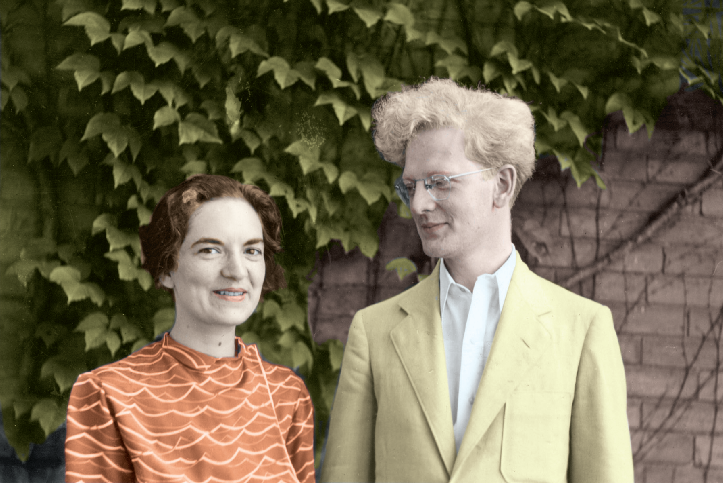
[Update] These letters are now posted in the Denham Libary under “Previously Unpublished Material” here.
The two letters below from Frye to Helen Kemp regarding his mother Cassie have never been published.
The first letter is undated but it was written sometime during the summer of 1940, when Frye had left Toronto to visit his sick mother in Moncton, NB. Helen, who had accompanied him on a trip to Moncton in July, had returned to their home on Bathurst Street in Toronto.
My pet:
Thanks for your letter. Nothing much has happened here. I want to leave soon: I couldn’t leave as long as mother had her bad spell: she was at her worst the day after you left. She’s getting much better but she won’t have a doctor, and that’s that. She gives a hundred and fifty different reasons: the house is so dirty she’d be ashamed to have a doctor in, God’s told her to take cod‑liver oil (which we got her), Dad would never pay the bill and we shouldn’t––the whole thing is that she’s got the idea she has cancer, and is afraid to have a doctor tell her so. Whether she has or not I of course don’t know, not being a doctor, but even if she has the worst thing we could do would be to bring in a doctor over her head. Dad, however, says she’s had this cancer bug since Vera was a baby. Her conversation is still a monologue of sickness and death and how many corpses that ghoul Aunt Dolly collected for her accursed boneyard. Mentally and physically, she’s a hundred years old.
I find Blake difficult here. Vera writes and says she’s coming to see us at Christmas, bless her heart. After one look at where they put my Forum article I gave in and got a haircut. I’ve been trying to locate my dentist, but he seems to have disappeared or joined the army or something. I drive around with Dad and lift cans of paint around for him––how he manages alone I don’t know. He hasn’t made any more trips, but talks of going to Toronto this week. We’ve got to look around and find a girl to come and live here during the winter: if she got her room free it would be well worth it. Sorry about the cut in the budget––not altogether unexpected, I suppose, and if Baldy is not too much of a born grafter to save on Ent. it perhaps won’t matter much.
There’s a bulky dress bag folded up on top of your suitcase: do you want it?
Dad saw Lichtenberg the other day and tried to tease him by telling him that another builder, a cheap shyster who undercuts his competition and swindles his clients, was tearing the town wide open and getting all sorts of orders. “Yeh,” said Lichtenberg. “I hear a rooster crowed like hell all vun morning. By night his head vass off.” I love you.
Norrie.
Vera = Frye’s sister
Aunt Dolly = Elthea Howard, eldest sister of Frye’s mother
Forum article = the reference is uncertain but the obvious candidates are “Poetry.” Canadian Forum 20 (July 1940): 125–6, and “War on the Cultural Front.” Canadian Forum 20 (August 1940): 144, 146.
Baldy = Martin Baldwin = curator and director of the Art Gallery of Toronto
Lichtenberg = Described by Frye in the Diaries as a “good-natured German in Moncton . . . who had been a peaceful, thrifty, industrious contractor there for thirty years. For two wars the local Gestapo have cut their teeth on him: when the news is bad or they get tired of reading spy stories they’d go up and practise on him. . . . Dad’s friendship for Lichtenberg has come in for much unfavorable comment in that stinking little kraal Moncton.”
Continue reading →

